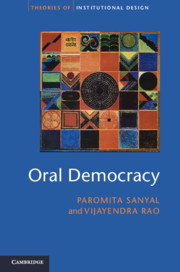Acknowledgments
We have contributed to this book equally. As long-suffering denizens of the latter end of the alphabet we decided to follow a recent proposal in economics and randomly assign the order of namesFootnote 1.
This book would not have been possible without thoughtful and generous contributions from a number of different people and organizations to whom we are extremely grateful:
We started writing the book about a decade ago. Early on the book found a great supporter in Bob Goodin, who encouraged us along the way. And John Haslam, our editor at Cambridge University Press, has waited patiently for us to finish it.
Grants from the UK Department for International Development (DfID), the Swedish Development Agency (SIDA), and the Development Communications Division of The World Bank funded the data collection. The Social Research Institute of the Indian Market Research Bureau under the able leadership of AV Surya recorded, transcribed, and translated the gram sabhas. The analysis of the data was partially funded by a grant to the World Bank’s Social Observatory from The South Asia Food and Nutrition Security Initiative (SAFANSI), which is financed by the European Union and DfID. However, we bear full and equal responsibility for the findings, interpretations, and conclusions expressed in this book, which do not necessarily represent the views of our funders or of our employers – the World Bank and Florida State University.
Radu Ban and Gillian Wade provided superb assistance in cleaning and initially coding the data. Peter Dimock, our editor, pushed us to make the book appealing to a broad audience, and his careful editing helped make our writing more succinct.
Many of the ideas in this book are the product of research conducted jointly with Kripa Ananthpur, Radu Ban, Tim Besley, Patrick Heller, Saumitra Jha, Ghazala Mansuri, Nethra Palaniswamy, Rohini Pande, Ramya Parthasarathy, Michael Walton, and Michael Woolcock.
Discussions over the years with several people have contributed to our thinking as well. We would particularly like to thank Arjun Appadurai, Mary Breeding, Varun Gauri, Bob Goodin, Scott Guggenheim, Michele Lamont, Jane Mansbridge, Lant Pritchett, J. P. Singh, Ann Swidler, and the wonderful and brilliant members of the Successful Societies Program at the Canadian Institute of Advanced Research.
Finally, we would like to thank our families for their encouragement and support. Vijayendra Rao is indebted to his parents, Surendra L. Rao and Vasanthi Rao Lokkur, for the example they set with their uncompromising integrity, and for teaching him about the power of debate in making the world a better place. He thanks his wife, Monica Biradavolu, for her intellectual companionship, for teaching him how to listen, and for making his world a much better place.
Paromita Sanyal owes much to her parents, Jharna Sanyal and Bikash Sanyal, for their lifelong intellectual encouragement and support and for enduring her absences. She would like to thank her husband, Mainak Mookherjee, who, as an academic, shares her excitement for research, endures her lengthy explanation of findings, and is liberal with his encouragement and support. And lastly, she wants to acknowledge her son, Aneesh, who infuses her life with love and laughter and provides a break from the insular process of writing.

